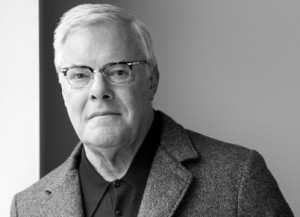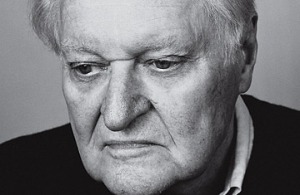for John Godfrey
1. Animals
Carved—indicated, actually, from solid
Blocks of wood, the copper-, cream-, and chocolate-colored
Cows we bought in Salzburg form a tiny herd.
And in Dr. Gachet’s etching, six
Or seven universal poses are assumed by cats.
Misery, hypocrisy, greed: A dying
Mouse, a cat, and a flock of puzzled blackbirds wearing
Uniforms and frock coats exhibit these traits.
Formally outlasting the motive
Of their creation with a poetry at once too vague
And too precise to do anything with but
Worship, they seem to have just blundered into our lives
By accident, completely comprehending
Everything we find so disturbing
About them; but they never speak. They never even move
From the positions in which Grandville or some
Anonymous movie-poster artist has left them,
A sort of ghostly wolf, a lizard, an ape
And a huge dog. And their eyes, looking
At nothing, manage to see everything invisible
To ours, even with all the time in the world
To see everything we think we have to see. And tell
Of this in the only way we really can:
With a remark as mild as the air
In which it is to be left hanging; or a stiff scream,
Folded like a sheet of paper over all
The horrible memories of everything we were
Going to have. That vanished before our eyes
As we woke up to nothing but these,
Our words, poor animals whose home is in another world.
2. Summer Home
Tiny outbursts of sunlight play
On the tips of waves that look like tacks
Strewn on the surface of the bay.
Up the coast the water backs up
Behind a lofty, wooded island. Here,
According to photographs, it is less
Turbulent and blue; but much clearer.
It seems to exercise the sunlight less
Reflecting it, allowing beaten silver sheets
To roam like water across a kitchen floor.
Having begun gradually, the gravel beach
Ends abruptly in the forest on the shore.
Looked at from a distance, the forest seems
Haunted. But safe within its narrow room
Its light is innocent and green, as though
Emerging from another dream of diminution
We found ourselves of normal, human size,
Attempting to touch the leaves above our heads.
Why couldn’t we have spent our summers here,
Surrounded and growing up again? Or perhaps
Arrive here late at night by car, much later
In life? If only heaven were not too near
For such sadness. And not within this world
Which heaven has finally made clear.
Green lichen fastened to a blue rock
Like a map of the spot; cobwebs crowded with stars
Of water; battalions of small white flowers.
Such clarity, unrelieved except by our
Delight and daily acquiescence in it,
Presumably the effect of a natural setting
Like this one, with all its expectations of ecstasy
And peace, demands a future of forgetting
Everything that sustains it: the dead leaves
Of winter; the new leaves of spring which summer burns
Into different kinds of happiness; for these,
When autumn drops its tear upon them, turn.
3. Domes
“Pleased in proportion to the truth
Depicted by means of familiar images.” That
One was dazed; the other I left in a forest
Surrounded by giant, sobering pines.
For I had to abandon those lives.
Their burden of living had become
Mine and it was like dying: alone,
Huddled under the cold blue dome of the stars,
Still fighting what died and so close to myself I could not even see.
I kept trying to look at myself. It was like looking into the sun and I went blind.
O, to break open that inert light
Like a stone and let the vision slowly sink down
Into the texture of things, like a comb flowing through dark,
Heavy hair; and to continue to be affected much later.
I was getting so tired of that excuse: refusing love
Until it might become so closely mated to its birth in
Acts and words of love; until a soft monstrosity of song
Might fuse these moments of affection with a dream of home;
The cold, prolonged proximity of God long after night
Has come and only starlight trickles through the dome;
And yet I only wanted to be happy.
I wanted rest and innocence; a place
Where I could hide each secret fear by blessing it,
By letting it survive inside those faces I could never understand,
Love, or bear to leave. Because I wanted peace, bruised with prayer
I tried to crawl inside the heavy, slaughtered hands of love
And never move. And then I felt the wound unfold inside me
Like a stab of paradise: explode: and then at last
Exhausted, heal into pain. And that was happiness:
A dream whose ending never ends, a vein
Of blood, a hollow entity
Consumed by consummation, bleeding so.
In the sky our eyes ascend to as they sweep
Upwards into emptiness, the angels sing their listless
Lullabies and children wake up glistening with screams
They left asleep; and the dead are dead. The wounded worship death
And live a little while in love; and then are gone.
Inside the dome the stars assume the outlines of their lives:
Until we know, until we come to recognize as ours,
Those other lives that live within us as our own.
—John Koethe (b. 1945) “Domes” from North Point North: New and Selected Poems (HarperCollins Publishers, 2002); originally published in Poetry (November 1970).

